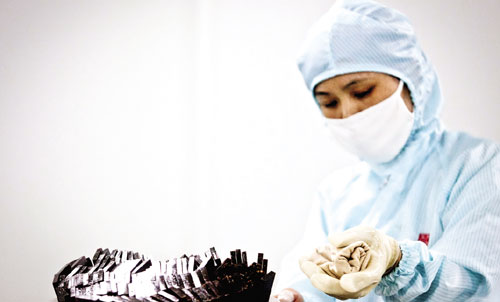TCM costs rise as donkey herds dwindle
Gelatin from animals' hides used for making traditional Chinese medicine
|
Dong'e Ejiao Co Ltd is applying for patents for its biological technology in China as well as in Japan, South Korea, the European Union and the United States. The company expects to sell 60 million yuan worth of its ejiao products to overseas market this year. Zhou Pinglang / China Daily |
Yu Pang, the mother of a 4-month-old baby, plans to buy an entire kilogram of ejiao (donkey-hide gelatin, a traditional Chinese medicine) as insurance against price hikes.
"I heard that the Dong'e Ejiao has raised its factory-gate price, which means retail prices will soon rise," Yu, of Jinan, capital of Shandong province, told China Daily on Thursday.
Yu's sources were right. Dong'e Ejiao Co Ltd, the largest Chinese ejiao maker by market share, announced on Sept 12 it would raise the product's factory-gate price by more than 50 percent due to shrinking supplies of donkey hide, from which ejiao is made.
It was the third time Dong'e had raised the price since last year. Last August, the company raised the price by 25 percent to 1,098 yuan ($178.70) per 500 grams, followed by a 19 percent increase to 1,298 yuan in January.
Ejiao is credited by many with improving blood circulation and replenishing energy. Its supposed beautifying effects make it a favorite among women.
Qin Yufeng, chairman of Dong'e Ejiao, said the factory has been forced to raise prices because raw material costs keep going up.
As machinery use in agriculture widens, donkeys are seldom seen working in fields anymore, which has dampened farmers' interest in raising the animal.
But demand for ejiao has been rising by an average of 30 percent a year, Qin said. This has triggered more enterprises such as TCM giant Beijing Tongrentang Group Co Ltd, the Chongqing-based Taiji Pharmacy Group Co Ltd and Changsha-based Jiuzhitang Co Ltd to enter the ejiao market, making donkey hides even more scarce.
Currently, 49 enterprises in China have approval by the China State Food and Drug Administration to produce ejiao.
Figures from agriculture authorities suggest the number of donkeys raised by farmers dropped to 6.03 million at the end of last year, compared with 11.2 million several years ago. And the number is still dropping.
"From a long-term point of view, raising the price is good for the industry," Qin said, explaining that as the company pays higher prices for donkey hides, this will encourage more farmers to raise the animal.
Last year, Dong'e Ejiao spent 2 million yuan more on donkey hides than in 2012. At least half of the amount went directly to the donkey breeders, said Qin.
To supply its factory, the company built a donkey farm in Chifeng in the Inner Mongolia autonomous region, with the number of animals now reaching 170,000, said Qin, who said that building a second donkey farm in the region is being considered.
Although continuing to use traditional ejiao-making techniques, Qin said the company keeps adding new elements in order to offset supply shortages. Molecular ejiao tablets will enter the market this year, he said.
Zhou Xiangshan, vice-chairman of the company who is in charge of bio-technology, said the new product contains "more efficient elements" than the traditional products and is easier to take.
The company is applying for patents for its biological technology in China as well as in Japan, South Korea, the European Union and America, Zhou said.
To help elevate the ejiao industry, the company will host an exhibition next year to showcase Dong'e's production techniques and quality control procedures, Qin said.
"Ejiao represents the quintessence of the Chinese culture. I hope we can better develop the industry and introduce the product to more people worldwide," he said.
Qin noted that one product - a syrupy compound of ejiao that he said is used to treat dengue fever - has been approved as an over-the-counter drug in China and is very popular in South-eastern Asian countries.
The company expects to sell 60 million yuan worth of the product to the overseas market this year, he added. Wang Qian contributed to this story.
Contact the writers at juchuanjiang@chinadaily.com.cn and zhaoruixue@chinadaily.com.cn
EJIAO DATES BACK MORE THAN TWO MILLENNIA
Ejiao (donkey-hide gelatin) is a traditional Chinese medicine dating back more than 2,000 years.
It is made by boiling a donkey hide and refining the gelatin. Traditionally, it is obtained from a series of processes of washing, soaking, rinsing and stewing the hide.
Ejiao production techniques have been listed as a national-class intangible cultural heritage.
Dong'e Ejiao Co Ltd, founded in 1952 in Dong'e county, Shandong province, is the largest company in China to produce ejiao. The company is listed on the Shenzhen Stock Exchange.
Traditional Chinese medicines, health tonics and biological drugs are the main products of the Dong'e company.



















